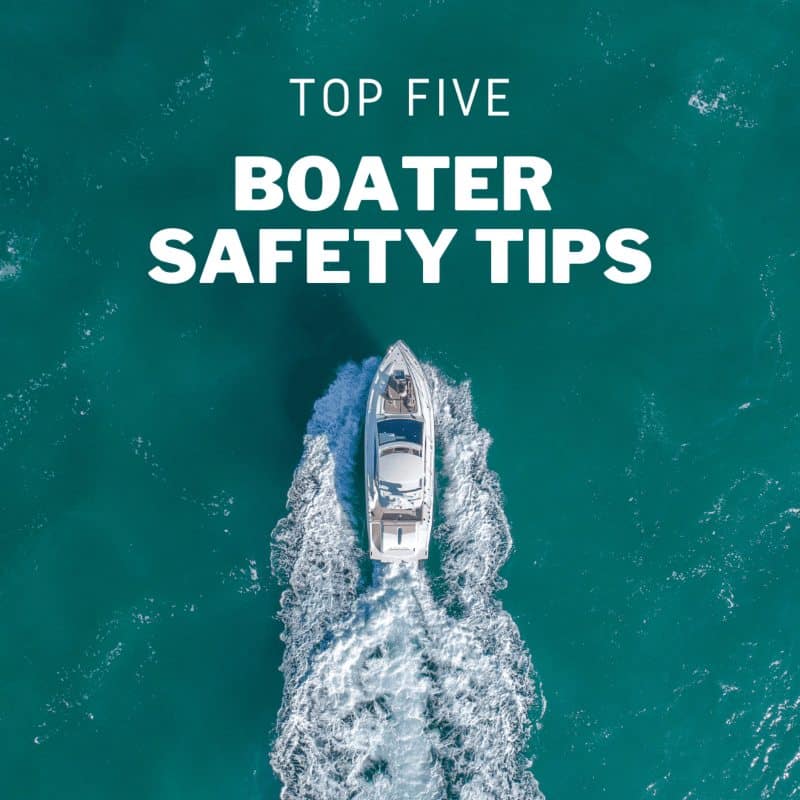Each year as the weather starts to warm up, many head to the water to enjoy a day of fishing, swimming, waterskiing, or kayaking, and if you live in Florida, warm weather tends to stick around longer offering the option to enjoy boating year-round.
Unfortunately, a lot of times, boater safety tends to take a back seat. Over 5,000 boating accidents occur yearly in the United States, causing roughly $62.5 million in damages, and the lack of boating safety education accounts for about 75% of fatal accidents.
The good news is that the majority of these accidents are completely preventable if you spend a little time reviewing a few simple safety precautions before you head out on the water. In this blog, we have put together the top five boater safety tips every boater should know.

Always Be Prepared
One of the first tips to consider when it comes to boating is that you can never be too prepared. Before you boat, its important to understand what is safe and legal in the area you are boating in. Most states require some type of boating safety certification or even a boating license. If you choose to rent a boat from our marina, all boat operators between the ages of 21 and 28 must have a Boater Safety Certificate.
You should also perform a pre-boarding safety check that includes:
- Gas levels, engine oil, and fluid checks
- Make sure you have the proper documentation for the boat onboard
- Make sure you have updated life jackets, a fire extinguisher, extra batteries, maps, flares, first aid kit, and operable boat lights
- Create a float plan of where you are going and who is with you and give to a friend or family member not in attendance in case of emergencies
- Get a free Vessel Safety Check
Don’t Forget Your Life Jacket
The U.S. Coast Guard estimates that simply wearing a life jacket could have saved the lives of more than 80% of boating fatality victims. The state of Florida requires all vessels to carry one USCG-approved wearable life jacket for each person aboard, and all children 6 and under are required to wear one at all times.
In addition, boats that are 16 feet and longer are also required to have a type IV throwable device on board. Make sure to check all of your life jackets each year, and double check that all children are wearing an appropriate life jacket size for their weight range.
Don’t Mix Alcohol and Boating
Drinking and boating can be just as dangerous as drinking and driving, but it’s found that many boat operators are much more casual about drinking a few while driving a boat. Keep in mind that operating a boat under the influence of alcohol (BUI) is illegal in all 50 states and most of the time is a federal crime. Drinking and boating is very similar to drinking and driving, with the legal limit for operating a boat at .08% BAL. Reaching this limit doesn’t take much, and most of the time you will feel the effects of alcohol much sooner if you are dehydrated while spending a day out in the hot sun.
Pay Attention to the Weather
Before you even set foot in a boat, you should always check the local weather, especially in Florida where afternoon storms fire up really quickly. Always be aware that weather can change rapidly, so keep an eye out for sudden wind shifts, dark skies, lightning in the distance or choppy water, and have a plan to get off the water as soon as possible.
If for some reason you find yourself stuck in unfavorable weather, it might be best to stay out on the open water if your return to shore is unsafe. Make sure to head the bow into the waves at a 45-degree angle and watch out for other boaters or debris.
Be Mindful of your Boat’s Propellers
Your boat’s propellers can cause some serious harm to those in your boat or anyone in the water. To avoid propeller injuries, make sure all passengers are accounted for before starting your engine.
Additionally, make sure to check the water around the boat as well. Make sure to watch children carefully and if possible, have them sit in an area away from the propellers. Shut off your engine immediately when approaching anyone in the water or if anyone falls overboard. Pay attention to swimming zones and no-wake zones as well.
Many times, if you keep the above boater safety tips in mind and review them each time before you boat, you can be well on your way to enjoying a safe and relaxing day on the water. Our crew at the Steinhatchee Marina will always make sure you are ready and prepared before you leave the dock. We look forward to assisting you with your next boating adventure!
